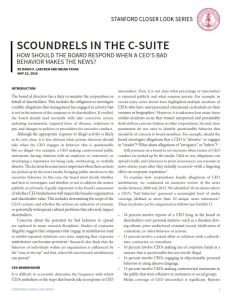Join getAbstract to access the summary!

Join getAbstract to access the summary!
David F. Larcker and Brian Tayan
Scoundrels in the C-Suite
How Should the Board Respond When a CEO's Bad Behavior Makes the News?
Stanford Business, 2016
What's inside?
What should the board of directors do when a CEO stands accused of injudicious, albeit legal activities?
Recommendation
How should a board of directors handle a “misbehaving” CEO? This report by David F. Larcker and Brian Tayan of Stanford University reveals mixed conclusions as to the degree CEO misconduct harms organizations and shows how boards lack consistency in their responses to misconduct. These contradictions underscore the importance of the questions the authors raise about how boards should respond and work to prevent poor behavior from leadership figures. getAbstract recommends this report to board members and those interested in corporate governance issues.
Summary
About the Authors
David Larcker is director and a senior faculty member at the Stanford Graduate School of Business Corporate Governance Research Initiative, where Brian Tayan is a researcher.



















Comment on this summary